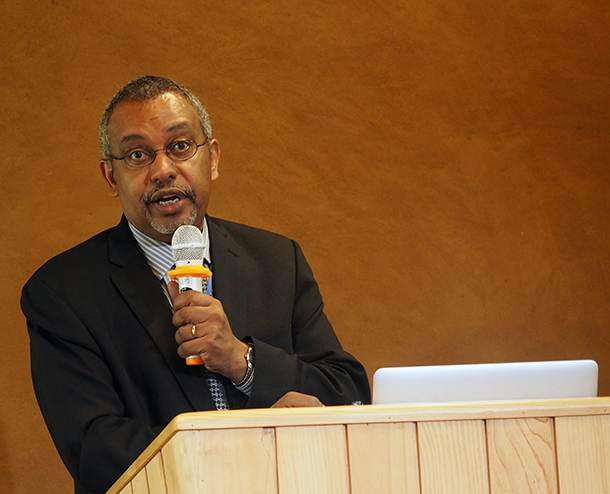The American Statistical Association named Kiros Berhane, PhD, professor of preventive medicine at the Keck School of Medicine of USC, among its 62 fellows in 2017, recognizing his biostatistics research, teaching and service to the scientific community at USC and in Africa.
An honor bestowed upon few
In the 100-year-old ASA fellowship program, members elect just a third of 1 percent of their peers for the honor each year.
Berhane, who also directs the Keck School epidemiology and biostatistics graduate degree programs, returns this fall after a 10-month sabbatical as a U.S. Fulbright Scholar in Ethiopia, where he taught and conducted research at Addis Ababa University, followed by two months at Imperial College in London.
In addition to helping develop the new statistics doctorate degree at AAU, he taught and designed courses and identified new research directions.
The ASA distinction lauds Berhane’s contributions to the development of new modeling techniques that help researchers understand air pollution exposure impact on respiratory growth and health in children.
Groundbreaking research in Africa
He is continuing this research in Eastern Africa as a principal investigator for the Eastern Africa Global Environmental and Occupational Health and Safety Hub (GEOHealth) alongside Jonathan Samet, MD, MS, Distinguished Professor and chair of preventive medicine, and Flora L. Thornton Chair in Preventive Medicine.
During his Fulbright tenure, Berhane focused on furthering the hub’s work, which will tackle new statistical methodological issues and data unique to sub-Saharan Africa. One of seven such hubs in the world funded by a five-year National Institutes of Health-Fogarty grant, it is pioneering air pollution, climate change and occupational exposures research in Ethiopia, Kenya, Rwanda and Uganda.
The work is a natural continuation of Berhane’s research and teaching around environmental health and growing interest in global health, he said. “I have always been passionate about seeking quantitative, mathematical solutions to pressing, real-life public health problems.”
A new frontier
In 2016, Forbes named biostatistics the top master’s degree for jobs based on its job growth projections, satisfaction ratings and mid-career pay data.
The ranking is not surprising in a world increasingly dependent on data-driven decision-making and a data-driven economy, according to Berhane. Technological advances have led to enormous volumes of information that need careful processing. For example, it is now possible to collect detailed data on where people spend their time, what they eat, what levels of air pollution they experience and more — all through mobile phone technology known in public health world as mHealth.
“To make sense of this highly desirable detailed information, one needs data analytic skills that can handle such ‘big data’ scenarios — and biostatistics is a perfect discipline for that,” Berhane said. Biostatisticians guide and inform proper use of this information deluge — “to separate the ‘signal’ from the ‘noise.’ ”
“The opportunities in biostatistics have never been more exciting and diverse than the present time,” he said, “and these opportunities will only grow in the future.”
— Larissa Puro


